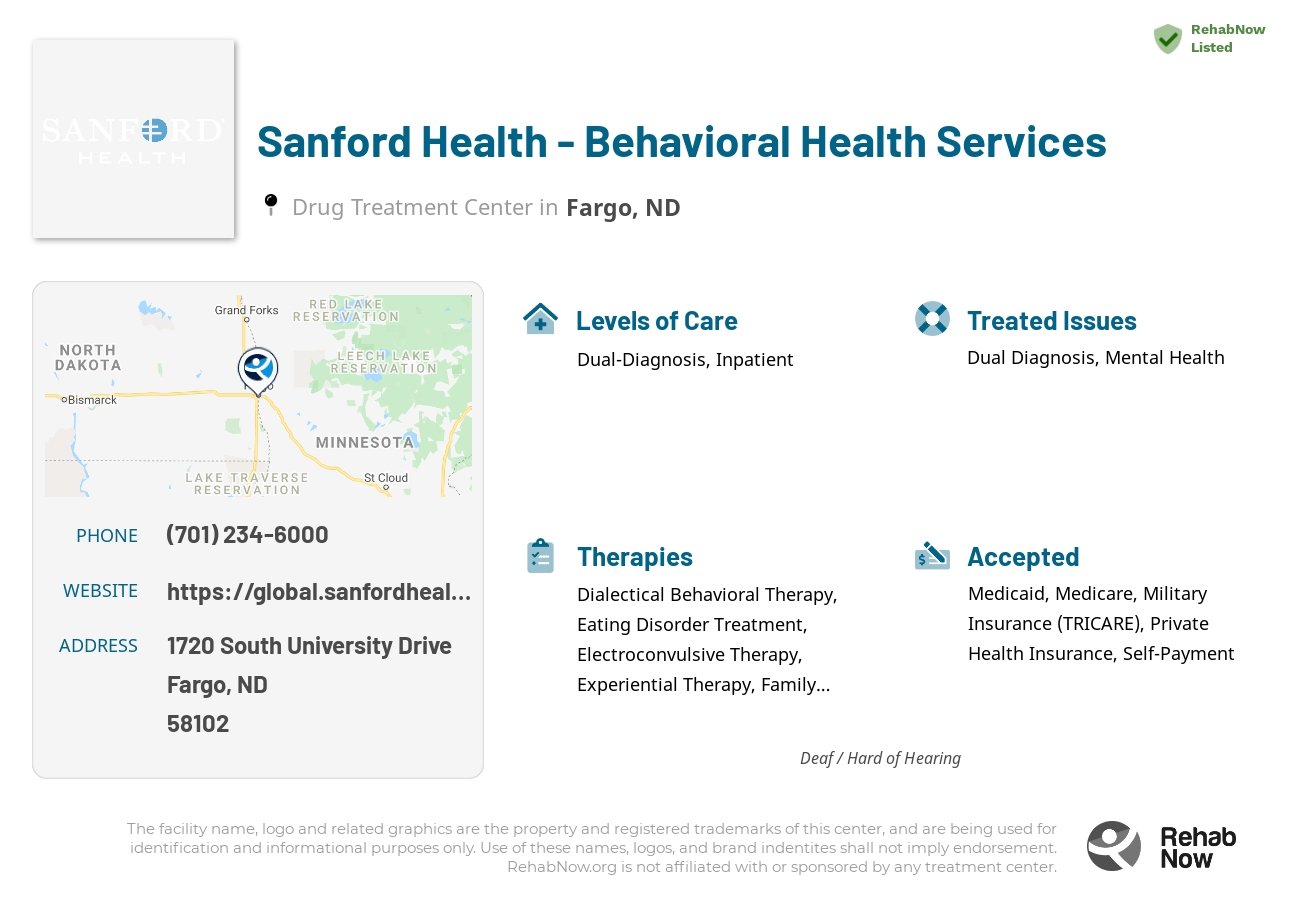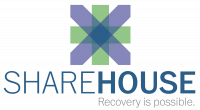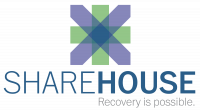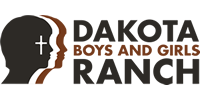Sanford Health - Behavioral Health Services
Drug Rehab Center in Fargo, North Dakota
Sanford Health - Behavioral Health Services provides compassionate and experienced mental health and dual-diagnosis care to patients in Fargo, ND, utilizing a variety of treatment methods, with private health insurance accepted as payment.
About Sanford Health - Behavioral Health Services in North Dakota
Sanford Health - Behavioral Health Services is a provider of mental and dual-diagnosis care in Fargo, ND. The Fargo branch of Sanford Health offers treatment to those struggling with mental health issues, such as depressed mood and anxiety, and to those who may be experiencing co-occuring disorders and addictions. Patients receive personalized care that includes a range of treatment methods ranging from dialectical behavioral therapy and trauma therapy to nutrition therapy and electroconvulsive therapy.
Patients at Sanford Health Behavioral Health Services have access to a variety of different levels of care, including inpatient and dual-diagnosis care. Furthermore, Sanford Health accepts private health insurance as payment for its services. With a team of compassionate and experienced professionals, Sanford Health is committed to helping patients to improve their mental health and to enhance their lives.
Genders
Ages
Modality
Additional
Conditions and Issues Treated
A drug rehab center that uses Dual Diagnosis is more likely to be successful in rehabilitating a person. Dual diagnosis helps to identify and treat any co-occurring disorders. It is essential to screen for both addiction and any untreated mental health issues. A dual diagnosis gives rehab the means to treat addiction while restoring mental and emotional health.
About 70% of patients with drug addiction have at least one other psychiatric diagnosis. Fortunately, dual diagnosis treatment is a proven model that has been highly effective.
Levels of Care Offered
This center offers a variety of custom treatment tailored to individual recovery. Currently available are Dual-Diagnosis, Inpatient, with additional therapies available as listed below.
Inpatient rehab means you live there while your addiction or co-occurring disorder is treated. Prescribed medications are used along with counseling.
This type of rehabilitation provides a drug-free environment for people who struggle with chronic/long-term addiction (or their own home). Jobs or school can be put on hold until after the stay to focus solely on recovery.
Therapies & Programs
During individual therapy at Sanford Health - Behavioral Health Services in , the person in recovery meets with a therapist one on one to go over their situation and learn from past mistakes. The counselor or therapist will use this time to address the causes of addiction, triggers, and any mental issue or dual diagnosis. They will also address aftercare plans, giving them the best chances of long-term sobriety.
This therapeutic process is very intense and challenging to go through. Some clients may find it easier to open up with someone apart from their family or loved ones who understand their struggles and experience with addiction.
Family therapy is designed to help addicts get clean and sober by using what they love the most; their family. Most drug treatment centers make it mandatory that the addict’s family attend therapy sessions, which is great because having everyone there to support them makes it much easier for them to get clean. Not only are they surrounded by people who want them to get better, but everyone is there because they want the best for them, not because they feel like they have to be.
Drug addicts are often surrounded by resentful or uneducated family members who would, at times, rather see them stay addicted because it makes their own lives easier. Sometimes they don’t understand what the addiction is or how they play a part in it. They know that during and after the addict’s sobriety journey, they will face challenges and changes that they aren’t sure how to handle. This can be very tough for an addict to go through on their own, which is why it’s so important that they have the support of their family. Just because someone is an addict does not mean that they don’t deserve the love and support of those around them.
Addicts in Fargo, ND can find support in group therapy at Sanford Health - Behavioral Health Services by finding peers who understand their situation and being held accountable. They also learn to develop faith, understanding, and insight into their addiction through shared conversations.
Group Therapy is employed by drug treatment centers to provide the recovering addict with a platform to talk about their feelings and experiences. It also provides for an opportunity to learn from other addicts who have successfully overcome their addiction. It is recommended that all group members be recovering addicts for this type of therapy to work.
Trauma therapy allows people who struggled with a past trauma to face the situation and learn from it. Many people go through traumatic events at an early age that later leads them into addiction as adults. By addressing this issue during treatment at Sanford Health - Behavioral Health Services in [/type], you can move forward with your recovery process and take back control of your sober future, too!
Traumas are one of the most common causes of psychological disorders such as Addiction Disorder. It’s often found among those diagnosed with Addictive Disorders because traumatized individuals have strong emotions or thoughts related to their traumas, leading to addictive behaviors.
Dialectical behavior therapy (DBT) is a cognitive-behavioral therapy that focuses on eliminating specific negative thoughts, such as suicidal thoughts. These negative thoughts can potentially lead to an individual inflicting self-harm. It helps treat patients exhibiting uncontrollable emotions, intense mood swings, and borderline personality disorders.
The term “Dialectic” means the integration of opposites. In substance abuse, DBT refers to accepting the patient’s addiction and working to change their thoughts and behavior. It improves life skills such as controlling intense emotions without reacting impulsively, resolving interpersonal conflicts effectively, and promoting awareness about self and others.
Cognitive Behavioral Therapy (CBT) helps addicts comprehend the causes of their substance abuse and the consequences that follow. The treatment’s goal is to help addicts gain self-control and maintain abstinence from drugs and alcohol over the long term. Through CBT, clients learn to recognize and avoid high-risk situations and cope with challenging situations when they arise.
Nutrition therapy has been used as a treatment modality for addiction recovery and in eating disorders for adults, adolescents, and children. Specific nutrients have been identified that influence neurotransmitters associated with reward pathways of the brain. Carbohydrate loading with complex carbohydrates to elevate serotonin levels was effective in treating bulimia nervosa. This approach prompted researchers to explore the use of this type of nutritional intervention in other disorders.
Nicotine replacement therapy is a popular method of treatment that helps individuals overcome their addiction to cigarettes by providing them with safer alternatives. Nicotine replacement options can include:
- Inhalers
- Gum
- Patches
These treatments are often used in combination with other therapies, such as cognitive behavioral therapy or motivational interviewing, to help individuals more easily transition into a smoking-free lifestyle.
Patient Experience
Experiential Therapy at Sanford Health - Behavioral Health Services
Experiential therapy is a type of treatment involving immediate, intense experiences designed to manage addiction. Experiential therapy is beneficial for:
- People who are seeking to overcome an addiction but have difficulty focusing on treatment goals
- People with short attention spans due to high levels of stress or difficulty concentrating
- People who are afraid of engaging in treatment due to negative past experiences
Payment Options Accepted
For specific insurance or payment methods please contact us.
Is your insurance accepted?
Ask an expert, call (888) 674-0062
Additional Details
Specifics, location, and helpful extra information.
Fargo, North Dakota 58102 Phone Number(701) 234-6000 Meta DetailsUpdated November 25, 2023
Staff Verified
Sanford Health - Behavioral Health Services Patient Reviews
There are no reviews yet. Be the first one to write one.
Fargo, North Dakota Addiction Information
Almost half of all road deaths in North Dakota are tied to alcohol. 18% of students from 9th through 12th grade admit to binge drinking. 14% of North Dakota high schoolers admit to abusing prescription drugs at least once. Alcohol is the most commonly abused substance in North Dakota, 5.26% of the population abuses alcohol in a year, which includes several minors. Binge drinking is a large problem, with 24.8% taking part.
9.3% of Fargo residents reported past-month use of an illicit drug. 18.2% of those who use heroin are most likely to abuse prescription painkillers. Methamphetamine lab seizures increased by 400% between 2007 and 2011. The most commonly abused drugs in Fargo are marijuana, cocaine, and opioids. There are many different types of treatment available in Fargo, North Dakota. Commonly available treatment options include inpatient rehab, outpatient rehab, and medication-assisted detox.
Treatment in Nearby Cities
- Parshall, ND (261.1 mi.)
- Killdeer, ND (282.6 mi.)
- Bismarck, ND (188.6 mi.)
- Cando, ND (159.3 mi.)
- Raleigh, ND (216.9 mi.)
Centers near Sanford Health - Behavioral Health Services
The facility name, logo and brand are the property and registered trademarks of Sanford Health - Behavioral Health Services, and are being used for identification and informational purposes only. Use of these names, logos and brands shall not imply endorsement. RehabNow.org is not affiliated with or sponsored by Sanford Health - Behavioral Health Services.





